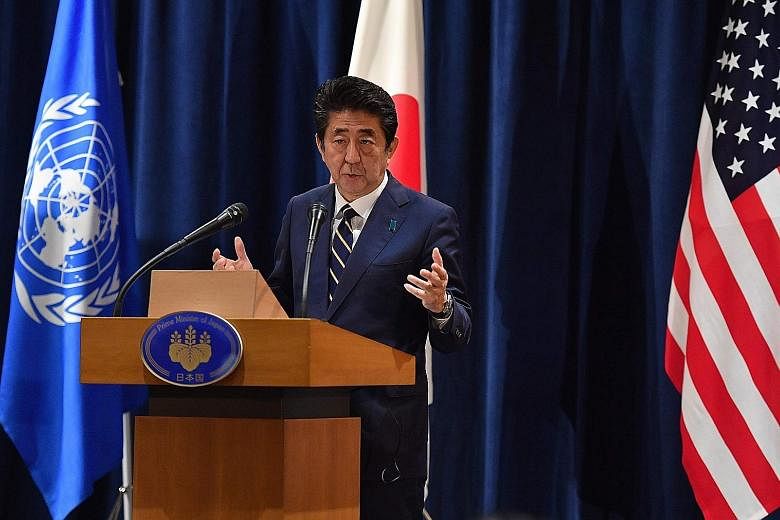The United States and Japan have inked a preliminary trade deal that will cut tariffs on American agricultural goods and Japanese industrial tools, while averting the threat of higher US car duties.
The agreement comes amid waning demand for US farm goods in Japan, where the entry into force of the revised Trans-Pacific Partnership (TPP) and a mega trade deal with the European Union have increased the popularity of cheaper Australian and French produce.
President Donald Trump, who is seeking re-election next year, on Wednesday hailed the "phenomenal" agreement as a "huge victory for America's farmers, ranchers, and growers", with Japan opening access to up to US$7.2 billion (S$9.9 billion) worth of US farm goods.
"Japanese tariffs will now be significantly lower, or eliminated entirely, for US beef, pork, wheat, cheese, corn, wine, and so much more," Mr Trump said, alongside Japanese Prime Minister Shinzo Abe in New York, where they were attending the UN General Assembly.
The leaders also signed a separate agreement on digital trade, covering commitments worth US$40 billion. Among other measures, the pact will free up the flow and exchange of digital products such as music, software and games, and ensure cross-border barrier-free data transfers across sectors.
These deals will likely be enacted on Jan 1, and will be succeeded by a full-fledged free trade agreement after a "second stage" of talks.
The agreements between the world's biggest and third-biggest economies - which together account for about 30 per cent of global gross domestic product and a population of 450 million - mark a rare trade success for Mr Trump, who is otherwise struggling to secure deals with countries like China.
Mr Trump has long assailed Japan - the US' security ally - for what he sees as unfair trade, citing Japan's trade surplus of US$67.6 billion last year. This "one-way street", he said, will be redressed by the "fair and reciprocal trade deals".
Mr Abe, in turn, also described their agreements as a "win-win solution (that) will further galvanise investment by the two sides and deepen our economic relations".
"We'll be able to bring benefit to everyone in Japan, as well as in the US, namely consumers, producers and workers," he said, noting that the chief negotiators on both sides - US Trade Representative Robert Lighthizer and Japanese Foreign Minister Toshimitsu Motegi - have worked to take into account their respective national interests.
Under the agreement, Japan will significantly lower its tariffs on US beef, pork, wheat, dairy and wine imports in line with TPP standards.
"If we had not done this, US agriculture would be at a disadvantage to TPP countries and some European countries," Mr Lighthizer told reporters. "This gets us equal, or better, than those people."
Washington will, in turn, expand its import quota on Japanese beef, and eliminate or reduce tariffs on Japanese produce like soya sauce, persimmons, melons and bonsai.
It will also eliminate or cut tariffs on industrial products, including machine tools, chemicals and steel products that are highly exported by Japanese companies.
Japan managed to win concessions on rice - a politically-sensitive area - offering no tariff-free quotas for American rice. But it did not succeed in getting the US to eliminate car tariffs, nor commit explicitly in writing that higher duties will not be imposed on national security grounds.
Still, as proof that no hike in car tariffs was imminent, the leaders pointed to their joint statement, which said that so long as both countries act in good faith, "they will not take action counter to the spirit of both deals".
In the next stage of talks, Japan will seek to eliminate the 2.5 per cent US duty on Japanese cars.

